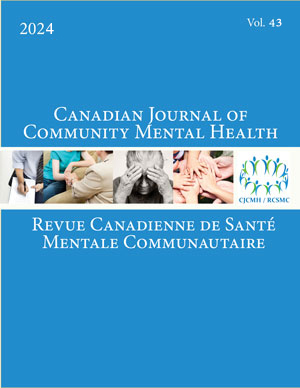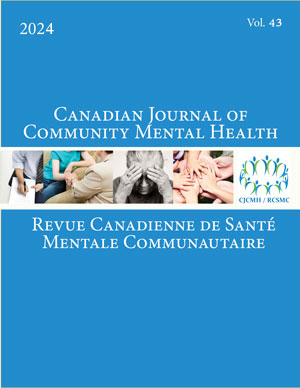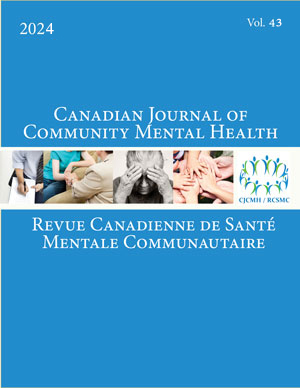Volume 41 • Number 1 • January 2022
Articles
OPEN ACCESS
Inappropriate emergency department (ED) use is costly. A system navigation service was developed to connect individuals with repeated ED presentations due to mental health or substance use to community services. Management, staff, and clients (n = 37) participated in interviews or focus groups to identify implementation challenges and associated solutions. Referrals were improved through ED staff support and automating the process. The outreach process, decreased service duration, and prompt support with connection to services facilitated program delivery. Two newly funded programs addressed the limited capacity of other services, and technology facilitated communication. Attention to partnerships and flexibility in the design were essential.
OPEN ACCESS
The purpose of this study was to understand physical activity experiences of pregnant and/or parenting individuals (PPI) who have histories of trauma. Utilizing feminist participatory action research, we conducted five focus groups (n = 37) with PPI and semi-structured interviews (n = 10) with service providers. Three themes were generated: (1) poverty and impoverished neighbourhoods limit availability of/ access to physical activity programs; (2) existing physical activity programs are not appropriate/appealing to PPI in this community; and (3) PPI live with multiple fears and judgment that impedes their physical activity. To adequately tackle health inequities, we propose a shift towards trauma- and violence-informed physical activity programming.
OPEN ACCESS
Muslims in Canada may have unmet psychological service needs, but little is known about their past use of, and future preferences for, mental health services. We addressed this gap with an online survey of 238 Canadian Muslims. Analyses investigated differences in intentions to seek support from various informal and formal sources. A majority (65%) of the sample reported at least moderate levels of current distress but only 48.7% sought professional treatment in their lifetimes. Participants preferred dealing with future psychological concerns themselves or with friends/family, closely followed by professional help. Imams were the least preferred source of support.
OPEN ACCESS
We investigated young people’s mental health (MH) and preferences for future MH services early in the Covid-19 pandemic to support user-centered service planning and delivery. We administered a webbased survey to young people living in Ontario. Logistic regressions identified predictors of worsening MH and service preferences among a sample of 1341 participants. 61.1% reported worse MH since the pandemic. Worsening MH was significantly associated with one MH and five sociodemographic factors. Participants’ MH and service preferences aligned well with clinical practice guidelines in that those with a greater self-reported MH need preferred more intensive MH services.
OPEN ACCESS
Cet article recense les rôles adoptés par les pairs dans le domaine des services aux personnes qui utilisent des drogues par injection (notamment en lien avec l’éducation, l’intervention, la référence et la recherche), ainsi que les facteurs qui facilitent ou entravent leur intégration dans les équipes de soins (tels que la clarté et la flexibilité des rôles, la formation et la supervision). La démarche a permis de soutenir les travaux d’un groupe d’experts (constitué de pairs) chargé de développer des recommandations pour l’intégration des pairs dans le cadre de l’implantation d’un programme de traitement par agoniste opioïde injectable au Québec.
OPEN ACCESS
This narrative inquiry consisting of an interview and a series of walkabouts with three persons living with schizophrenia identified five experiences: (1) feeling something was wrong, (2) being diagnosed, (3) a turning point, (4) their life starting over, and (5) achieving a feeling of peace or acceptance. All three narratives identified sense of belonging as the key to understanding movement through these stages. The implications for mental health practitioners are the need for patient access to peer social interactions during the early stages of diagnosis, opportunities for self-determination in care practices, and a greater focus on belonging within hospital settings.
Practice Innovations
OPEN ACCESS
In Canada, Indigenous populations have an increased prevalence of psychiatric disorders and distress. Mental health mobile applications can provide effective, easy-to-access, and low-cost support. Examining grey literature and academic sources, this review found three mobile apps that support mental health for Indigenous communities in Canada. Implications and future directions are discussed.
OPEN ACCESS
The ENCOMPASS-ED project implemented embedded health system navigation and mental health peer support to proactively engage frequent emergency department (ED) users, facilitate linkages to community services, and reduce ED overuse. This model of care is generalizable to other communities across Canada to support reductions in unnecessary and costly ED visits.










